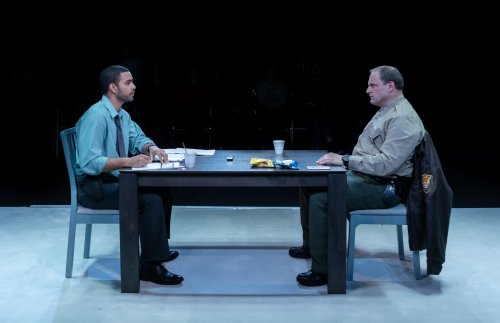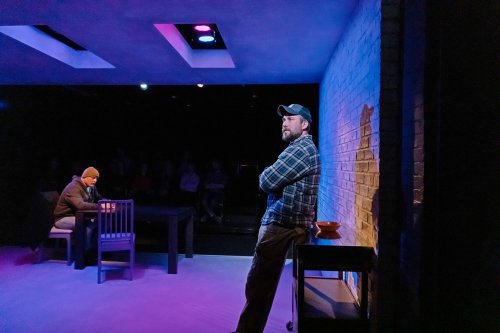17 Minutes
The simplicity of this production lends a kind of grace to Scott Organ’s excellent, uncompromising play about the aftermath of a school shooting.

Brian Rojas and Larry Mitchell in a scene from Scott Organ’s “17 Minutes” at The Barrow Group (Photo credit: Joey Moro)
[avatar user=”Mark Dundas Wood” size=”96″ align=”left”]Mark Dundas Wood, Critic[/avatar]
A play about a school shooting—or any mass shooting—is a dicey proposition. Even if the treatment is first-rate, such a play will likely be loaded with ways of going wrong: by inadvertently oversimplifying the situation, by alienating people on one side or another of the political divide, or by inducing a sense of despair in Americans about the ongoing failure to curb such horrors. Even for people who aren’t looking for pure escapism when planning a night at the theater, a play on this subject is, understandably, not always top of list.
That said, one hopes that people will somehow feel open to seeing 17 Minutes, Scott Organ’s astonishingly effective new drama from Manhattan’s The Barrow Group, directed with a steady hand by Seth Barrish.
The play succeeds in large part because it begins in the aftermath of a school shooting. There are a few bits of dialogue describing the terror of the incident itself, but there is no onstage representation of the violence, nor any long, involved retelling of it. None of that is really needed, because the chaotic, nightmarish imagery of such episodes has become engrained in our imaginations over the years. Nor does the play aim to offer a solution to the mass-shooting scourge. Instead, it tells a simple—yet decidedly powerful—human story about a figure who is, paradoxically, both on the periphery of the incident and at its heart.
The play opens with a scene in which a sheriff’s deputy, Andy Rubens (Larry Mitchell), meets with a detective, Virgil Morris (Brian Rojas), about the shooting that has taken place earlier that day at the school Andy is charged with protecting. He had been guarding the south entrance to the building and had waited there, having heard shots fired somewhere inside the facility.

Larry Mitchell and Shannon Patterson in a scene from Scott Organ’s “17 Minutes” at The Barrow Group (Photo credit: Joey Moro)
Andy reveals that he remained near the entrance in order to ascertain where the shooting was taking place. He contends that he waited a short time before a support team arrived at the school to help subdue the shooter. Detective Morris, however, points out that there were actually 17 minutes of inaction on Andy’s part. The detective is polite. He gives Andy the benefit of the doubt. But the question that hovers in the air is unmistakable: shouldn’t Andy—a combat veteran—have moved into the building to intervene directly after he first heard shots? Andy’s explanation is awkward and unconvincing. “Time got weird,” he maintains. When he learns the extent of the bloodshed that morning, it’s a quiet but pulverizing blow.
The rest of the play is a series of scenes—each with Andy and one other character—that trace the trajectory of the deputy’s life in the days and weeks following the shooting. There are three scenes with Andy and his wife, Samantha (DeAnna Lenhart), one with his deputy partner, Mary Stevens (Shannon Patterson); one with the father of the shooter, Dan Watson (Michael Giese), and one with the mother of one of the victims, Cecelia Bauserman (Lee Brock).
This play is one of those rare instances in which all elements—the writing, the casting, the performances, the direction, and the production design—fit together perfectly. The watchwords here seem to have been simplicity and directness. Organ and Barrish tell the story with calm assurance. There are no fancy curlicues or unnecessary digressions.
Mitchell is the heart of the production, and his performance invites us to relate to the character, prompting us to wonder whether we would have had the courage to do what Andy could not. Mitchell’s acting is not full of theatrical fireworks. It’s stark and quietly harrowing.
The other actors are all excellent, but Patterson and Brock give especially fine performances.

Larry Mitchell and Michael Giese in a scene from Scott Organ’s “17 Minutes” at The Barrow Group (Photo credit: Joey Moro)
It turns out that Deputy Stevens—who shares a close bond with Andy—has been the hero of the story. She, almost supernaturally. has encountered and apprehended the young shooter. This makes her, of course, seem the polar opposite of the allegedly cowardly Andy. The situation causes her embarrassment and consternation. She is humble when she meets with Andy—insisting that any valiance on her part was only a case of doing her job. Patterson, however, plays the scene with a self-conscious smile on her face. As much as she protests that she’s no savior and that she understands why Andy didn’t likewise rise to the occasion, that embarrassed smile tells a somewhat different tale.
Andy’s scene with Cecelia is the final sequence in the story, and it provides Brock with the fuel for a memorable performance. Cecelia is—by turns—sympathetic, apprehensive, sardonic and fearful. Pain has ravaged her eyes and face. We see that she has experienced not only the loss of her child and the loss of hope, but also the very chance for a life with meaning. Brock provides a haunting glimpse of a woman who’s shattered but still, somehow, on her feet.
The audience sits on two sides of the playing area. Edward T. Morris’ set consists of a few basic pieces of furniture—a table and simple chairs, a coffee cart—that are shifted between scenes to represent various locales. It’s all appropriately austere.
In the first several scenes, Solomo n Weisbard’s lighting design provides a steady glare, denoting, it seems, the naked exposure by the community of a man’s failure to measure up. Not until the scene between Andy and Dan Watson, the shooter’s father—set in a bar where the once proudly sober Andy goes to seed—do we get a moment with refuge from this punishing light.

Larry Mitchell and DeAnna Lenhart in a scene from Scott Organ’s “17 Minutes” at The Barrow Group (Photo credit: Joey Moro)
The costumes by Matsy Stinson is appropriately unremarkable. The people in the play are Everymen and Everywomen of Middle America, and they wear what middle-class Americans in suburban or rural America would wear.
Again, the play doesn’t pretend to offer solutions for stemming the tide of senseless violence. It does, though, ask us to put ourselves in the skin of someone who may have succumbed to fear of that violence. How would we measure up if we’d been in the protagonist’s position?
For that matter, how do we measure up? Andy may or may not have failed to do what needs to be done to stop a particular school shooting, but aren’t we, collectively, just as fearful and powerless to take measures to do what’s needed to curb the madness? Organ and Parrish beckon us to drop our judgmental impulses and admit that there’s plenty of inaction in America to go around.
Despite all, the play is somehow not depressing. There’s something about the stark honesty of Organ’s story and of the production itself that lends the play a kind of grace. This is an extraordinary piece of theater that should be widely seen.
17 Minutes (extended through March 1, 2020)
The Barrow Group
TBG Mainstage Theatre, 312 West 36th Street, in Manhattan
For tickets, call 866-811-4111 or visit http://www.barrowgroup.org
Running time: one hour and 40 minutes without an intermission






Leave a comment